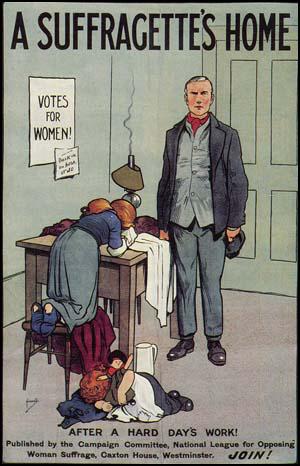You might find yourself scratching your head at this but in the early 20th century, not only were there women campaigning for the vote but some arguing AGAINST females joining the electoral register.
How could that be? Well, take for example the imposing intellectual figure of Mary Humphrey Ward. She had campaigned for an all-women’s college at Oxford university but when it came to votes for women – political equality with men – she wasn’t having it.
DISCOVER: Women in history – scandal and myth!
Ward was the highest paid female novelist in Britain in the first decades of the 20th century. The J K Rowling, in financial and fame terms, of her day. Her nephew, Aldous Huxley, went on to write Brave New World – yes, the book that the recent TV series is based on.
Ward became a leading light in the Women’s National Anti-Suffrage League, an organisation dominated by men – surprise! It commanded huge audiences at its rallies and exercised considerable influence in political circles. Ward’s opposition to women getting the vote was a combination of instincts, prejudices and some rational arguments.
It rested in part on the notion that women are ‘different’ and equality isn’t necessarily the best outcome. This is still a moot point among some feminists today.
It also underscores the hostility some feminists feel at the current time towards transsexuals. The whole ‘terfs’ versus ‘trans’ row you can witness every day on Twitter. Being a woman is a unique proposition in other words. It’s not just about having the same deal as men. And women are different – therefore equal treatment isn’t automatically progressive. The thinking runs.
DISCOVER: The vampire Countess Bathory!
Ward disliked the methods of the ‘suffragettes’, who were viewed by polite society as verging on terrorists. There was also her squeamishness about lesbians – of which there were a few among the campaigners for women’s rights. As a Victorian lady, Ward wasn’t that open minded on the issue!
Many of those who campaigned alongside her supported the use of vicious and unpleasant postcards demeaning women as essentially thick or feckless – so undeserving of the vote. They also warned men that women’s suffrage would result in them doing all the housework. Oh horror!
Ward, however, was more sophisticated in her opinions. The idea of difference being paramount comes across strongly in her writing:
Women are not ‘undeveloped men’ but diverse, and the more complex the development of any state, the more diverse. Difference not inferiority – it is on that we take our stand.
She assigned to women the roles of mother and carer. And worried that involvement in national political affairs would corrupt their true nature. However, Ward didn’t oppose women being involved in running local schools, hospitals and charities because she thought that was an extension of their domestic housekeeping role.
FIND OUT MORE: LGBT men hanged in London in the 18th century
She did support the idea of a Ministry for Women, but operating alongside parliament – not in it. And Ward suggested reserved seats for women on local councils. But whatever the subtle nuances of her position, and the popularity she undoubtedly had, the first world war proved to be a dynamo for change, demolishing all opposition to universal suffrage.
Despite continuing opposition, votes for women were eventually conceded. And by the time of Ward’s death in 1920, her views were already looking incredibly reactionary. So much so that the novelist Virginia Woolf even mocked her in a very catty obituary.







